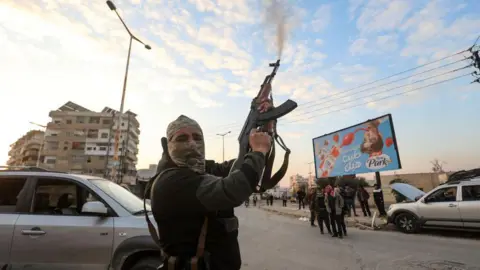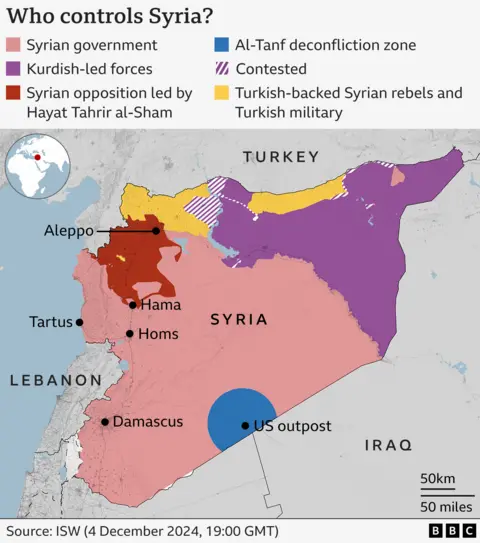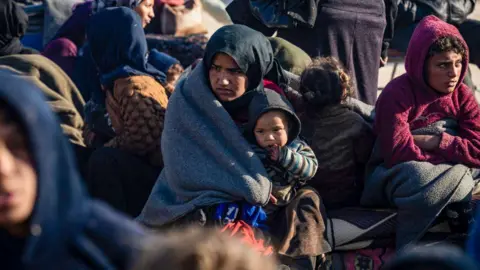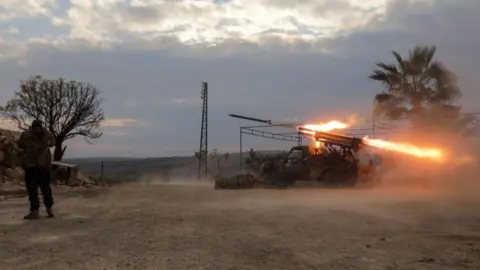Syrian rebels capture second major city after army withdrawal

 AFP
AFPIn another blow to President Bashar al-Assad, Syrian rebels say they have taken full control of the second major city after the army withdrew its troops from Hama.
The leader of the Islamist militant group Hayat Tahrir al-Sham (HTS), Abu Mohammed al-Joulani, declared “victory” in Hama and vowed that “there will be no revenge”.
Earlier, HTS fighters and their allies captured Hama central prison and released prisoners amid fierce fighting, while the army said it had redeployed troops outside the city.
Hama is home to one million people and is 110 km (70 miles) south of Aleppo, which rebels captured last week after launching a surprise offensive from their stronghold in the northwest.
The rebel commander told residents of Homs, the next city to the south on the highway from Aleppo to Damascus, that “your time has come”.
In the past, President Assad relied on Russia and Iran to crush his opponents.
But with both allies busy with their own affairs, it is unclear how – or if – he will be able to stop the surge that could threaten the existence of his government.
More than half a million people have been killed since the civil war broke out in 2011 following a violent crackdown on peaceful pro-democracy protests by the Assad government.

After several days of heavy fighting rebels broke through government defensive lines north of Hama.
After the fall of Aleppo the army sent reinforcements to the city. But despite Russian airstrikes and support from Iran-backed militia fighters, troops were unable to prevent the capture of Hama on Thursday.
Rebel commander Hassan Abdul Ghani said in the morning that his fighters were engaged in fierce fighting in various districts.
In the early afternoon, he announced that hundreds of prisoners had been released from Hama’s central prison.
Minutes later, the army announced the redeployment of troops outside Hama “to protect civilian lives and prevent urban warfare.”
Photos and video posted online and verified by the BBC showed fighters in several north-eastern areas. The released prisoners were also filmed celebrating with a reporter from a pro-rebel and opposition news outlet outside the central prison.
Abdul Ghani later announced: “We are happy to inform you that Hama has been completely liberated after our forces ended the search operation.”
He also said rebels had cleared the Hama military airport on the city’s western outskirts, as well as Jabal Zain al-Abadin, a strategically important hill in the north-east that overlooks the Damascus-Aleppo highway. .
In a video, Abu Mohammed al-Joulani said his fighters had entered Hama to “cleanse the wound that has existed in Syria for 40 years.”
He said, “I pray to Almighty God that this will be a victory without any revenge.”
HTS leader was mentioned 10,000 to 25,000 people killed in the city in 1982When the late President Hafez al-Assad sent tanks and artillery to crush the Islamist insurgency.
A similar strategy has been adopted across the country by his son Bashar over the past 13 years.
 AFP
AFPThe Syrian Observatory for Human Rights (SOHR), a Britain-based monitoring group, says more than 820 people have been killed across the country since the start of the rebel offensive eight days ago – most of them fighters, but also including 111 civilians. ,
The UN has said the fighting is “exacerbating an already dire situation for civilians in the north of the county”.
An estimated 280,000 people have been displaced, the majority of whom are women and children, and some civilians are trapped in front-line areas and unable to reach safety.
In Aleppo, home to two million people, some public services and vital facilities – including hospitals, bakeries, power stations, water, internet and telecommunications – meanwhile remain disrupted or non-functional due to lack of supplies and personnel.
UN Secretary-General Antonio Guterres urged “all those with influence to play their part” to end the civil war.
“We are witnessing the bitter fruits of the chronic collective failure of previous de-escalation arrangements to produce a genuine nationwide ceasefire or a serious political process,” he said. “This has to change.”
President Assad has vowed to “crush” the rebels and accused Western powers of trying to redraw the map of the region, while his key allies Russia and Iran have offered him “unconditional support”.
Russian warplanes have stepped up their strikes on rebel-held areas in recent days, Iran-backed militias have sent fighters to reinforce government defensive lines, and Iran has said it would attack Syria if asked. Ready to send additional forces.
Turkey, which supports the Syrian opposition but has denied reports that it is involved in the HTS-led attack, has called on Assad to join a political process with the opposition to end Syria’s 13-year civil war. Are requested to participate.
Meanwhile, Turkish-backed rebel groups have taken advantage of the government’s retreat to the north to launch a separate attack on a section of the city near Aleppo, controlled by the Kurdish-led militia coalition, the Syrian Democratic Forces (SDF). Was. Türkiye, home to a large restive Kurdish minority, views the Kurds in Syria as a threat.
 AFP
AFPBefore the start of the rebel offensive, the government had regained control of Syria’s main cities with the help of Russia, Iran, and Iran-backed militias. However, large parts of the country remained outside its control.
The rebels’ last strongholds were in Aleppo and Idlib provinces, which border Turkey and are home to more than four million people, many of them displaced from government-held areas.
The enclave was dominated by HTS, which is designated a terrorist organization by the United Nations, the US, Turkey and other countries because it was an affiliate of al-Qaeda in Syria until it formally severed ties in 2016.
Turkish-backed SNA factions and Turkish forces, as well as several allied rebel factions and jihadist groups, were also based there.
HTS and its allies said on 27 November that they had launched an offensive to “stop the aggression”, accusing the government and allied Iran-backed militias of increasing attacks on civilians in the northwest.
But this came at a time when the government’s allies were busy with other controversies.
The Iran-backed Lebanese group Hezbollah, which was key in pushing back rebels in the early years of the war, has recently been hit by Israeli attacks in Lebanon. Its new leader Naim Qassim said on Thursday he would “remain at Syria’s side in thwarting the goals of this aggression as much as we can”.
Israeli strikes have also eliminated Iranian military commanders in Syria and disrupted supply lines to pro-government militias there.
Russia has also been distracted by the war in Ukraine.






